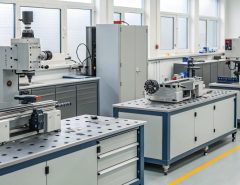The data from AlmaLaurea take the photograph of the mechanical engineer: from his formative characteristics to the appeal received on the labor market. And what an appeal! After 5 years from the end of the university the work is stable and the earnings are close to 1,800 dollars a month, almost 500 dollars more than the “colleagues” engineers.
HOW DO YOU BECOME A MECHANICAL ENGINEER? – According to the Almalaurea data, there are 420 second-level graduates from 2009 who work as a mechanical engineer five years after winning the title. Young people who have obtained a two-year master’s degree (99.5%), in almost all cases by enrolling in a course of study in the engineering disciplinary group. In particular, they obtain the title by attending in the vast majority of cases the classic degree course in Mechanical Engineering, but also Design and Energy Engineering. This path is mainly followed by males (men represent 90% against 40% of the average), who work mainly in the North (62% against 48%).
QUICK TO GRADUATE … – And how do they manage at the university? They prefer speed, so much so that at 26 they already have the title in their pockets (against an average age of 27.2 years recorded for the total of second-level graduates), in 87% of cases at most they close the books within one year of the course (83% for the complex); the average degree mark is slightly lower than the average (107 against 108). But in their curriculum there is no lack, as for other graduates, of international experiences (19%) and internships in the company (53%), completed during the studies. And if you ask him what they think of the completed university path, I promote it all right, to the point that if they can go back to the time of registration, in 89% of cases they would choose the same course and the same university.
… AND TO FIND WORK – They do great: in most cases mechanical engineers, although they start working only once they have taken home their degree (81% against 64%), the first job arrives much faster than the average: 4.2 months against 7.1 of the colleagues . And when they find it, it is not only relevant to what they have studied (60% use the skills acquired at university a lot against 51% of the average) but it is also very stable (91% against 70%): 82% can in fact, count on a permanent contract (46% for postgraduate graduates).
SUPER-SALARY – The gain is also high: at five years from the title I earn 1,765 dollars a month net, against the 1,336 dollars of the complex. And once inside, where do they go? A good thing, there must is the private sector (95% versus 73%), in companies operating in the engineering and precision mechanics (54%) or chemical and energy sectors (16%); only 10% opt for consulting companies.
BUT WHAT DOES IT EXACTLY? – The mechanical engineer uses his knowledge in the field of mechanics to design, plan and functionally control, to produce and maintain instruments, engines, machines and other mechanical equipment. He directs these activities, conducts research and studies on the technological characteristics of the materials used and their production processes.
In particular they must (in order of importance according to ISFOL data)
- Design machines and other mechanical equipment
- Perform functional tests
- Perform experimentation and prototyping
- Create, modify or verify software and other applications
- Carry out surveys, calculations or measurements
- Prepare and present scientific research projects
- To direct and supervise the activities of projects in the industrial production sector
- To take care of the management of research projects
- Designing plants
- Checking or managing the correct application of safety regulations
WHICH CHARACTERISTICS MUST HAVE? – According to ISFOL data, mechanical engineers must have some particular personal characteristics to do this type of work at best. The most important are those concerning the ability to understand and analyze the documents submitted to them, as well as natural communication skills. Essential then to have a critical sense, that is to use logic and reasoning to identify the strengths and weaknesses of solutions, conclusions or alternative approaches to problems. The mechanical engineer must then have an analytical, practical, accurate and methodical personality; he must also be familiar with working with the computer and willingness to make decisions and solve problems.
Tags: Mechanical Engineer





Leave a Reply